/PAlogo_v2.gif) |
|
Post Reply 
|
| Author | |
Man With Hat 
Collaborator 
Jazz-Rock/Fusion/Canterbury Team Joined: March 12 2005 Location: Neurotica Status: Offline Points: 166178 |
 Topic: Birdsongs Of The Mesozoic Topic: Birdsongs Of The MesozoicPosted: December 08 2010 at 22:27 |
|
Lovely interview! Hopefully some of this structured improv reaches its way onto cd soon.
|
|
|
Dig me...But don't...Bury me
I'm running still, I shall until, one day, I hope that I'll arrive Warning: Listening to jazz excessively can cause a laxative effect. |
|
 |
|
memowakeman 
Special Collaborator 

Honorary Collaborator Joined: May 19 2005 Location: Mexico City Status: Offline Points: 13032 |
 Posted: December 08 2010 at 18:14 Posted: December 08 2010 at 18:14 |
|
Great interview as usual. They are an excellent band!
|
|
|
Follow me on twitter @memowakeman |
|
 |
|
avestin 
Special Collaborator 

Honorary Collaborator Joined: September 18 2005 Status: Offline Points: 12625 |
 Posted: December 08 2010 at 15:49 Posted: December 08 2010 at 15:49 |
|
Thanks for this interview of a unique band, love their sound.
|
|
 |
|
zravkapt 
Special Collaborator 

Honorary Collaborator Joined: October 12 2010 Location: Canada Status: Offline Points: 6446 |
 Posted: December 08 2010 at 15:43 Posted: December 08 2010 at 15:43 |
|
Good work, Torodd! BOTM is one group on my ever growing list of groups I want to hear.
|
|
 |
|
SaltyJon 
Special Collaborator 

Honorary Collaborator Joined: February 08 2008 Location: Location Status: Offline Points: 28772 |
 Posted: December 08 2010 at 14:16 Posted: December 08 2010 at 14:16 |
|
Great interview! This is one band I've been meaning to check out for a while, never have yet though.
|
|
 |
|
toroddfuglesteg 
Forum Senior Member 

Retired Joined: March 04 2008 Location: Retirement Home Status: Offline Points: 3658 |
 Posted: December 08 2010 at 03:27 Posted: December 08 2010 at 03:27 |
|
Birdsongs Of The Mesozoic play an eclectic blend of rock, avant-garde noise, punk, classical, minimalist and free-form music with hypnotic electronic sequences. They began in the early 80's as a side project by pianist/percussionist Roger Miller and guitarist Martin Swope from Boston's Mission Of Burma. After many changes, the line-up eventually settled down to Erik Lindgren (piano and organ), Ken Field (saxes, flutes and percussion), Rick Scott (synths, piano and percussion) and Michael Bierylo (guitar, programming and sound design). I got in touch with them for this interview and both Erik Lindgren and Ken Field answered the questions. ---------------------------------------------------------------------------------- I have got all your biographical details so let's not waste your time with that. But why did you choose that name ? Erik Lindgren: Back in 1980, our original guitarist Martin Swope was playing an LP
called "Birdsongs of America" which consisted of various bird calls. Pianist
Roger Miller accidentally misread the spinning label as "Birdsongs of the
Mesozoic" and the rest is history. Roger's father was an ictyhologist (with a
focus on prehistoric desert fish) and was well-versed with that terminology, so
Mesozoic wasn't an unfamiliar word to him. To start with; please give me your (long or brief)
thoughts and lowdowns on....... 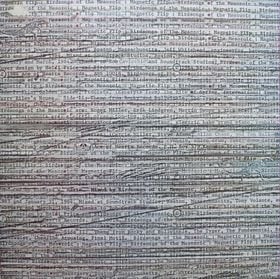 Magnetic Flip Released from 1984
Erik Lindgren: This was our
sophomoric musical outing and represents the group at one of our most creative
periods during our Triassic era. We did a lot of touring at that time and were a
tight performing unit. Our first record EP was created in the studio but
material from Magnetic Flip was worked out on the road. This release really
showcased the live ensemble at the time and I think is one of our strongest
releases which covered a vast amount of musical diversity. Our final release
with Roger Miller, appropriately titled Beat of the Mesozoic, was recorded live
in the studio. Rick Harte brought the ensemble up to Canada and we had a couple
of days at the world-class facility Le Studio, which is where Rush and David
Bowie recorded. I remember that the engineer was totally freaked out when we set
up our primitive PA system as if we were playing a live show. And we didn't even
use headphones! So much for sound leakage--which worked well to our
advantage. 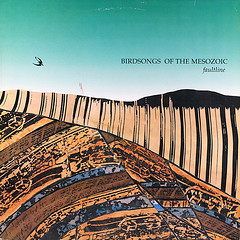 Faultline from 1989
Ken Field: This is one of my favorite Birdsongs albums, mainly because I had the
opportunity to play along with Steve Adams, who is the saxophonist I replaced in
the group. He's a wonderful composer and player, and I was glad that it worked
out for both of us to appear simultaneously on this transitional album.
Erik Lindgren: This and Pyroclastic were recorded with engineer Bob
Winsor who was a real craftsmen. I'm especially happy with how my composition
"Coco Boudakian" turned out and think that work is one of our best sonic
recordings. Martin's deconstruction of "Chariots of Fire" was a very curious
work as with his powerful piece "They Walk Among Us," which employs a rhythm
track culled from a Led Zeppelin song. 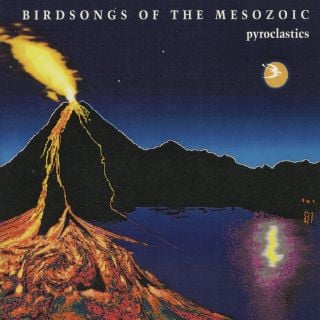 Pyroclastics from 1992
Erik Lindgren:This is our last recorded effort with guitarist Martin Swope. I think
that our two covers, "Theme From The Simpsons" and the Beach Boy's "Our Prayer,"
hold up well and are still part of the ensemble's performing repertoire. Some of
my compositions including "Tyronglaea II," "Sled," and "Pleasure Island" show
the compositional direction that I was heading in, which is more complex
harmonically and rhythmically than our previous work. 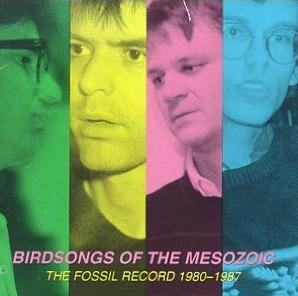 The Fossil Record (1980-1987) from
1993 Erik Lindgren: This collection of demos was recorded at my studio in Cambridge MA.
Some of these compositions would have been on our next recording had Roger
Miller stayed with the ensemble. Those pieces employ my Memorymoog which was a
truly brilliant synth with amazing analog sounds. I'm really glad we did these
sessions and it shows our more eclectic side. Unfortunately this has been out of
print for years so perhaps Cuneiform will make it again available in the future.
This also includes our one long improvisation for Michael Burlingame's art film
"To A Random." I remember us watching the film in my studio and spontaneously
playing along with it. We did the entire score in one long take, except for the
last few minutes in which Martin and I overdubbed different parts resulting in a
more smooth coda rather than the jagged ending that he and I originally played.
Startign off the CD are "Pulse Piece" and "Sound Valentine," both of which are
the first two pieces that we recorded when the band was just a project in 1980.
"Tyronglaea," "Chen," and "Sombre Reptiles" were also early demos that we
captured on tape and have a lively quirky spontaneity to them. 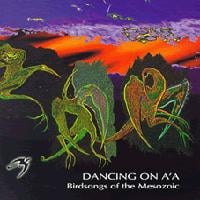 Dancing on A'A from 1995 Erik Lindgren: We were fresh from our third tour to Hawaii and discovered that there
are two types of lava there--puhi is the smooth lava while A'A is the
rough-surfaced type. The title track has a lot of wild energy and I like its
sonic crunch. Michael's three pieces, "Deborahs," "Ray" (a reference to Ray
Charles), and "Birdgam" all really rock out! Roger Miller wrote "Swamp" for us
which has his musical signature. My minimalist work "Ptinct" has also been
arranged for a larger ensemble consisting of woodwind quartet, string quartet,
piano, guitar, synthesizer, and cymbal. "Sirius" was conceived as a bolero with
a 7/4 repetitive beat that constantly evolves. Our loopy cover tune for this CD
was "Peter Gunn," which actually has a slick accompanying black and white music
video that you can see on Youtube. Likewise "Electric Altamira" is about the
most jazzy work I've ever written and has a terrific artsy video by filmmaker
Henry Ferrini that's also posted on Youtube. That rhythm track incorporates
three fellows from Dorchester MA doing beatbox sounds with their mouth that I
originally recorded for a commercial project. 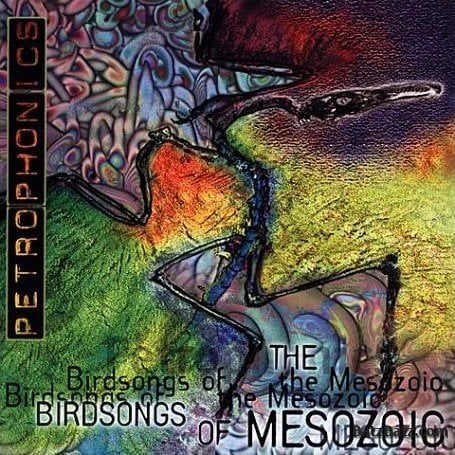 Petrophonics from 2000 Erik Lindgren: To me, this is one of my favorite Birdsongs' CDs and I especially like
Michael's title track, which was subtitled "Math Rock" since it constantly
changes time signatures. "Ptoccata II" was another minimalistic composition that
was conceived in the mid '80s as a compliment to "Ptoccata," which appeared on
Magnetic Flip. "Music Inspired from 1001 Real Apes" is actually a 4-movement
work that I refer to as my "Elements Suite" ("Time Marches On" is "Air,"
"Dinosaurs Theme" is "Fire," "Gravity Theme" is "Earth," and Quincy Sore Throat
Theme" is "Water"). And yes, it loosely pays homage to Brian Wilson's suite with
the same name from his Smile period ("Fire" indeed has musical references to
"Mrs O'Leary's Cow"). Parts of these 4 pieces were adapted for the 1001 Real
Apes CD that we did in collaboration with NPR Storyteller/Duplex Planet editor
David Greenberger. My three-movement work "The Insidious Revenge of Ultima
Thule" is a dark trilogy that was always an effective live piece. Another
interesting anecdote is that the rhythm track to "Birdhead" is a complete
4-minute piece by the NYC band Drumhead" that included Pere Ubu's Tony Maimome.
I composed the music around this improvised piece which had a unique form. Ubu
was certainly a major influence on me in the late '70s so I wanted to pay homage
to them with this piece. Rick Scott usually comes up with one composition per CD
and I especially like the sonic quality of his "Study of Unintended
Consequences" which is a truly radical work. 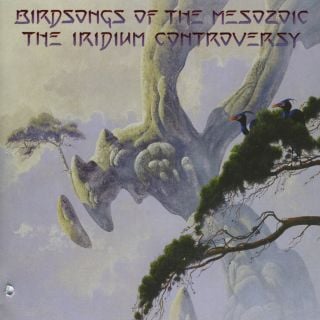 The Iridium Controversy from 2003 Erik Lindgren: The name of the title track was actually an afterthought but turned out
to be quite relevant. Part 1 musically describes the Earth before the meteor hit
while Part 2 is the planet rebuilding itself from a cosmic disaster. I used a
Bolero pulse to portray the beat of the Earth coming back to life. I'd
eventually like to hear it performed with acoustic classical instruments but
that could be said about pretty much all of my Birdsongs' compositions. We also
revived two old Bird chestnuts, "Lost In The B-Zone" and "The Beat Of The
Mesozoic-Part 1," both of which appeared on our "Beat" EP from 1987. Each of
these works are pieces that we still like to end our sets with, and Michael's
pyrotechnic guitar work and percussion sequencing bring them into Y2K.
While we were working on this body of work, the group performed at NEARfest
2001 and made the connection with visual artist Roger Dean. We opened the
festival and the promoters liked our set so much that we remixed our material
and they issued it on their label. We were elated to meet Roger and our music
really resonated with him. When we were tossing around graphic ideas, we had the
audacity to ask him if he'd we willing to do a cover for us. Although we aren't
in the financial league of bands like Yes who use his artwork for their jackets,
we did strike a financial deal. Roger also asked if we would play at his NYC
gallery opening which was a dream come true. For me, performing at that opening
with over 30 original Dean paintings was one of the highlights of my Birdsongs'
career. He found the name of our ensemble inspiring, so the artwork he produced
for us (appropriately titled "Birdsongs of the Mesozoic") was prominently
displayed there with a $150,000 price tag.
Another work of mine on that CD, "100 Years Of Excellence," was originally
commissioned by my hometown of Middleborough MA for the Centennial of our public
library. I have an alternate recording of that for flute, clarinet, bassoon,
piano, and drum kit by my other musical ensemble The Frankenstein Consort
(SFZ-004) which came out in 2006. I like Ken's "This Way Out," which is a
continuation of his groove-oriented pieces. Michael's "make The Camera Dance"
and "Sherpas" are once again terrific complex woks that seem to effortlessly
flow. "Race Point" is a musical tone poem describing the peaceful tip of Cape
Cod. The parts of that work are dictated by a timeline which don't line up
rhythmically, so the composite effect is almost like a musical wind
chime. 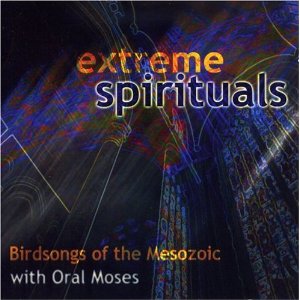 Birdsongs Of The Mesozoic With Oral Moses: Extreme
Spirituals from 2006 Erik Lindgren: For over 25 years, I've been good friends with Oral Moses who is one of
the foremost authorities and interpreters of African American Spirituals (http://www.oralmoses.com). Throughout the
years, I've produced 3 solo CDs of art songs and spirituals for Oral, and last
year produced the Georgia Spiritual Ensemble's CD which is his vocal group
comprised of Oral and five of his students. Although we live in different
musical worlds, I always wanted to merge our two musical visions into one
unlikely project. In 2001, I received a grant from the American Composers Forum
to do three spiritual arrangements which eventually led to this unorthodox body
of work. I remember playing some of the demos to a good friend of Oral's, who
was a Baptist minister and familiar with the traditional rhythm-section/Hammond
organ-based repertoire. After hearing what we did, he wanted to ask "Why are you
doing this?" since it was so alien to his musical aesthetic. We've done about a
half-dozen live performances of Extreme Spirituals with Oral, and it's always a
thrill to hear his booming authoritative vocal. Every arrangement is totally
unique and poses different musical challenges, and I especially like the extreme
diversity that we created. 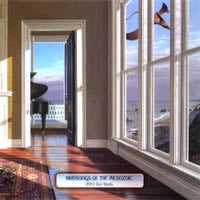 Your live album 2001 Live Birds
2004
Ken Field: This is our only live release, and I personally
think it is a great representation of the band at that time.
Erik Lindgren: A lot of credit has to go to mix engineer Ken
Lacouture, who really pulled a rabbit out of a hat with these recordingsl.
Amazingly, our entire set (with the exception of our first piece "Petrophonics"
which had some severe technical and musical problems) was able to be
resurrected. It really shows our sonic fire and fury, and that Birdsongs is
primarily a live performing ensemble. What is the latest update on Birdsongs Of The Mesozoic
?
Ken Field: We are currently transitioning from our long-time
focus on composed music to more of a hybrid compositional/improvisational
approach. This is exciting to me personally, since improvisation plays such a
large role in my solo work and in my other musical projects. Improvisation has
the potential to bring the unique energy of spontaneity to a performance, and
the results can be strongest when combined with the structure of
composition.
Erik Lindgren: During this past decade, we've worked on
collaborations with various individuals including David Greenberger on 1001 Real
Apes and Oral Moses on Extreme Spirituals. Currently we're working with Ben
Cantil who plays live electronic percussion and was an MPE student of guitarist
Michael Bierylo at Berklee. After 3 decades of doing mostly composed music,
we're expanding our musical palate with structured improvisation. This is a bit
of a stretch for me since I'm primarily a classical musician who feels more
comfortable reading music on paper. But I like being pushed in a different
direction which I find inspiring. How would you describe your musical development from
your first album to this date ?
Erik Lindgren: Birdsongs started off as a real alternative to the early '80s
alternative rock scene. Creating an instrumental quartet consisting of three
keyboards and guitar with electronic/acoustic percsussion who read music onstage
was a truly radical idea. Many of the early pieces were based around Roger
Miller's experimental piano works from the '70s that had musical roots in the
harmonic language of Stravinsky and Bartok. Through the years, the material has
gotten more sophisticated ... for better or worse. Paradoxically, the
compositions that I brought in a few years ago just seemed to be too complex and
started losing the Birdsongs vision. Consequently we scrapped that body of
unrecorded work and shifted gears with more simplistic ideas based around
improvisation. Hopefully we'll get to record this for our next
release. How would you describe your music and which bands or
scene would you compare your music with ? Erik Lindgren: It's tough to objectively draw parallels with other ensembles since the
music of Birdsongs is such an anomaly. Aesthetically, we have little in common
with most of the guitar-based Cuneiform bands. But with that said, the label is
a perfect fit for us since they have a reputation for marketing contemporary
progressive rock-based music--whatever that may mean. I do see a musical
parallel between us and Universe Zero although they tend to be darker and more
European sounding in comparison to our eclectic keyboard-driven repertoire.
Ideally, I'd like to see us continue the musical lineage of contemporary
classical composers like Ginastera, Stravinsky, and Reich, but incorporating a
rock aesthetic that encompasses the punk/psychedelic attitude of the MC5, 13th
Floor Elevators, early Pink Floyd, plus integrating contemporary music
technology. When Birdsongs was actively touring, we'd often have people come up
to us after a show and say "You're not from around here," which kind of sums up
the ensemble. How is your label situation and what is your
experiences with the music industry ?
Ken Field: We are fortunate to be affiliated with one of the
best labels in the world, Cuneiform Records. They are passionate about music,
and extremely supportive of our work. And unlike much of the music industry,
they are incredibly honest!
Erik Lindgren: Prior to our wonderful association with Cuneiform,
we were blessed to do three records with the Boston-based Ace of Hearts label.
These were compiled in the late '80s on a Rykodisc CD which gave us lots of
visibility and our kooky rendition of "Theme From Rocky And Bullwinkle" made one
of their compilation CDs which got our name around. I know there are so many
tales of woe with shady labels but we've been blessed to work with Steve
Feigenbaum and Rick Harte, both of whom have impeccable integrity and really
believe in our music. What is your plans for this year ? Erik Lindgren: Along with the aforementioned collaboration with Ben Cantil, we're
trying out new ideas that are based on improvisation which is a stretch for the
band. 2011 is really our thirtieth year so hopefully we'll pull together a
musical spectacle similar to our 20th anniversary concert at the Somerville
Theatre which was a lovely retrospective. Just to wrap this interview up; do you have any regrets
in your music career ?
Erik Lindgren: One always can be more prolific, more productive, and more ambitious.
But I'm fairly pleased with evolution of Birdsongs and the musical legacy that
we've produced during the past 30 years. Hopefully we'll have another three
decades of throwing musical wrenches and breaking boundaries. What is your five alltime favourite albums
? Ken Field: Just three off the top of my head:
Cream-Disraeli Gears
Miles Davis-In a Silent Way
Procol Harum-A Salty Dog
Erik Lindgren: Without too much thought, here are six (plus the two
slots that Ken passed on):
Erik Satie-Complete Works for Piano (Aldo
Ciccolini)
Alberto Ginastera-Piano Concerto #1
Rising Storm-Calm Before
Stooges-Fun House
Jim Hendrix Experience-1st LP
Brian Wilson-Smile
Juan Garcia Esquivil-Space Age Bachelor Pad Music
Raymond Scott-Reckless Nights and Turkish
Twilights Anything you want to add to this interview
?
Erik Lindgren: Thanks for supplying some fun questions. Stay progressive! Thank you to Erik Lindgren and Ken Field for this interview |
|
 |
|
Post Reply 
|
|
| Forum Jump | Forum Permissions  You cannot post new topics in this forum You cannot reply to topics in this forum You cannot delete your posts in this forum You cannot edit your posts in this forum You cannot create polls in this forum You cannot vote in polls in this forum |